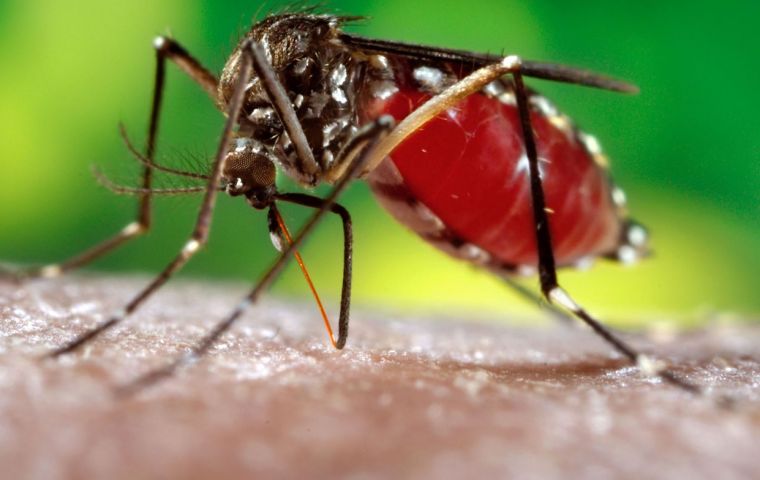MercoPress. South Atlantic News Agency
Brazil accounts for nearly 70% of dengue cases in LatAm and Caribbean
 Still, Brazil has reduced the number of deaths in the current dengue epidemic from previous years
Still, Brazil has reduced the number of deaths in the current dengue epidemic from previous years According to a survey conducted by the Pan American Health Organization (PAHO), Brazil accounted for almost 70% of dengue cases in Latin America and the Caribbean, where some 4.6 million infections were confirmed this year, representing a 237% interannual increase, Agencia Brasil reported. PAHO is the arm of the World Health Organization (WHO) in the Americas.
The new figures were announced by PAHO arbovirus specialist Carlos Melo during a seminar on arboviruses organized by the Oswaldo Cruz Foundation (Fiocruz) in Rio de Janeiro. Arboviruses are diseases caused by viruses transmitted mainly by mosquitoes, such as Aedes aegypti, which transmits dengue, Zika, and chikungunya.
The large increase is caused by the numbers of the epidemic in Brazil. The country will have more than 3.1 million probable cases in 2024, or 67.4% of all cases in Latin America and the Caribbean. In absolute numbers, Brazil tops the list, followed at a considerable distance by Paraguay, Argentina, and Peru, with no more than 200,000 cases each. However, Brazil ranked second in the incidence ratio, behind Paraguay.
Paraguay has a rate of 2.54 cases per 1,000 inhabitants, while Brazil has 1,816 as per PAHO estimate. However, Brazil's Health Ministry claims the incidence rate is 1.529/1,000. The difference is believed to stem from PAHO counting suspected cases as positive before laboratory results came out negative.
Regarding the number of confirmed dengue deaths, Brazil has 1,292 records as of 2024, again topping PAHO's ranking of absolute numbers. However, in proportional terms, Brazil stands behind Paraguay, Guatemala, Peru, Bolivia, Honduras, Ecuador, and Argentina.
Of the 25 countries covered by the PAHO study, 12 were found to have dengue outbreaks. For PAHO, one of the causes behind the epidemic in Brazil and the outbreaks in other countries is the El Niño phenomenon, an abnormal warming of the waters of the Pacific Ocean, arguably the largest ever recorded. “This behavior is clearly associated with climate change,” Melo said.
The specialist also pointed out that even European countries and the United States, where there were no major outbreaks, are now registering incidences of dengue. “The magnitudes will be totally different from one place to another, but we can already see the spread of this transmission.”
Experts explain that the effects caused by El Niño, such as heat waves, with droughts in some regions and storms in others, favor the proliferation of Aedes aegypti. The mosquito is more active in hot weather where the virus' incubation time is shorter and hence the malady is transmitted more quickly.
In addition, drought increases the need to store water, often done in an inappropriate manner, leading to the appearance of breeding sites, which also multiply after storms.
PAHO also highlighted that Brazil has reduced the number of deaths in the current dengue epidemic. Despite cases in 2024 almost doubling those of last year, there has been a proportional reduction in the number of deaths. “This is a very important point, to have an increase in transmission and not have a significant increase in deaths,” Melo pointed out.
“We shouldn't just look at the issue of transmission and the number of cases. We have to look at death, which is the first objective in controlling an epidemic, reducing the number of deaths and then reducing serious cases,” he added as Brazil reached 3.1 million probable cases of dengue in the first 14 weeks of 2024. Brazil's current mortality rate is 4.21% in 2024 compared to 5.22% in 2023, most likely as a result of sanitary campaigns, including the vaccination of the most affected people, Melo also explained.
Brazil uses the Qdenga vaccine, produced by the Japanese laboratory Takeda. Immunization is achieved with two doses, 90 days apart. The vaccine is safe and its use has been approved by the National Health Surveillance Agency (Anvisa). Given its short supply, Brazil has limited the drug to the 10-14 age group, the one said to account for the highest number of hospitalizations, second only to the elderly.
(Source: Agencia Brasil)




Top Comments
Disclaimer & comment rules-

Read all commentsThis is President Lula's fault. He is killing Brazilians. He should be impeached.
Apr 13th, 2024 - 06:49 pm 0Commenting for this story is now closed.
If you have a Facebook account, become a fan and comment on our Facebook Page!